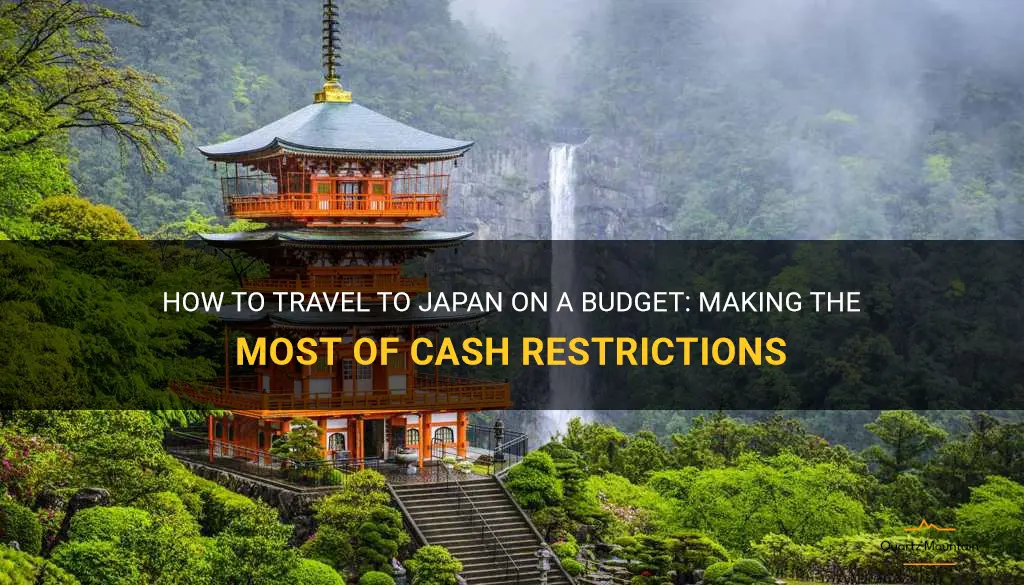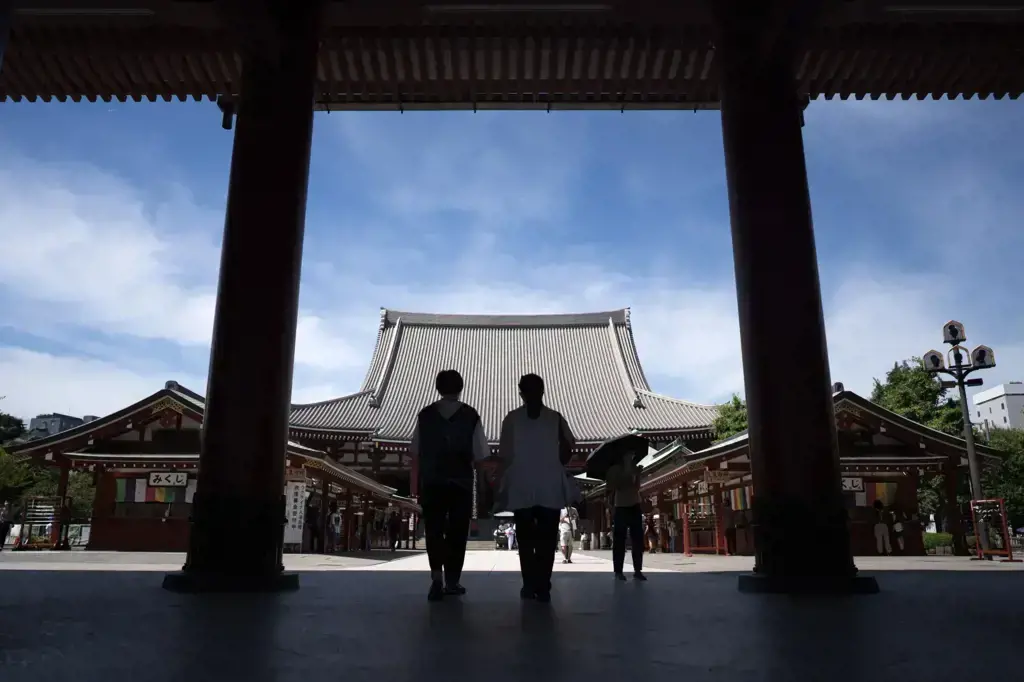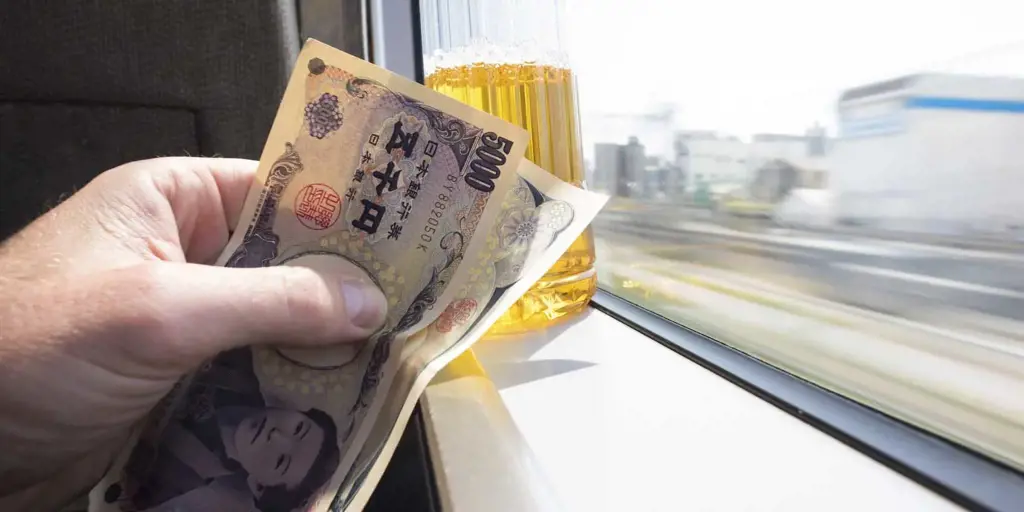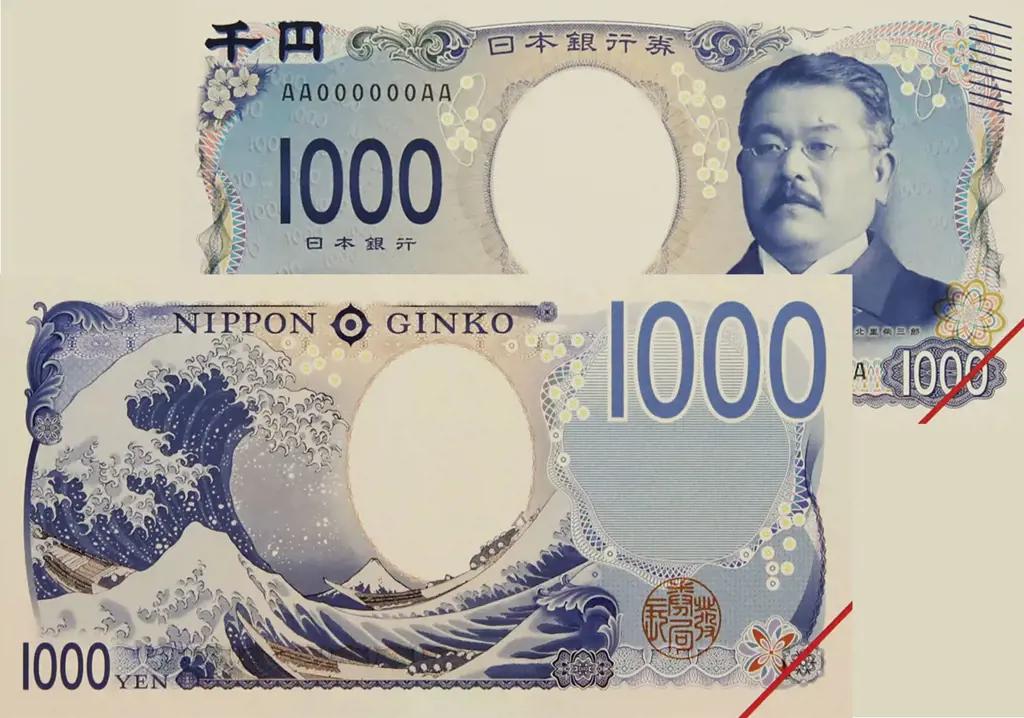
Are you planning a trip to Japan and wondering about the best way to carry money? If so, you're in the right place. In this article, we will explore the topic of cash restrictions and how to navigate them when traveling to Japan. From understanding the reasons behind these restrictions to finding alternative payment methods, we've got you covered. So grab a cup of green tea and let's dive into the world of cash restrictions in Japan!
| Characteristics | Values |
|---|---|
| Currency | Japanese Yen (JPY) |
| Denominations | 1,000 yen, 2,000 yen, 5,000 yen, 10,000 yen |
| Exchange Rate | Varies daily |
| Accepted Locations | Most shops, restaurants, hotels, and tourist attractions |
| Credit Card Acceptance | Widely accepted, especially in larger cities |
| ATM Availability | Abundant throughout Japan |
| ATM Usage Fee | Varies by bank and type of account |
| Traveller's Checks | Accepted at some banks or major hotels |
| Mobile Payment | Popular and widely accepted, including services like Apple Pay and Google Pay |
| Tips | Not expected, but may be appreciated in certain situations |
| Cash Limits | There is no specific limit on the amount of cash you can bring into or take out of Japan, but amounts over 1 million yen must be declared at customs |
What You'll Learn
- What is the maximum amount of cash that can be brought into Japan for travel purposes?
- Are there any restrictions or regulations on carrying cash while traveling to Japan?
- How should travelers handle their cash while in Japan to ensure its safety?
- Are there any limitations on using credit cards or debit cards instead of cash in Japan?
- Are there any specific currencies that are more widely accepted in Japan?

What is the maximum amount of cash that can be brought into Japan for travel purposes?

When traveling to Japan, it is important to know the regulations regarding the amount of cash that can be brought into the country. This article will provide information on the maximum amount of cash that can be brought into Japan for travel purposes.
As of July 2021, there is no specific limit on the amount of cash that can be brought into Japan. However, travelers must declare if they are carrying cash exceeding 1 million yen (approximately $9,000) or its equivalent in other currencies. The declaration can be done at the customs counter upon arrival in Japan.
It is worth noting that even if you do not exceed the 1 million yen limit, you may still be asked to provide details on the exact amount of cash you are carrying during the immigration process. This is a part of standard security measures to prevent money laundering and illegal activities.
In addition to the declaration, it is advisable to keep proof of the source of your funds, especially if you are carrying a large amount of cash. This can include bank statements, ATM receipts, or any other document that verifies the legality of the funds.
It is important to plan your travel budget accordingly and consider alternative methods of payment such as credit cards, prepaid travel cards, or traveler's checks. These options can provide added convenience and security during your trip to Japan.
If you are carrying a significant amount of cash, it is always a good idea to check with the embassy or consulate of Japan in your home country for the most up-to-date regulations and recommendations.
In conclusion, there is no set maximum amount of cash that can be brought into Japan, but any amount exceeding 1 million yen must be declared upon arrival. It is advisable to plan your travel budget and consider alternative payment methods to ensure a smooth and hassle-free travel experience.
Understanding the Travel Restrictions on Aa.com: What You Need to Know
You may want to see also

Are there any restrictions or regulations on carrying cash while traveling to Japan?

When traveling to Japan, it is important to be aware of the restrictions and regulations regarding the amount of cash one can carry. While there are no specific limits on the amount of cash you can bring into Japan, there are regulations in place for both entering and leaving the country with large sums of money.
When entering Japan, if you are carrying more than 1 million yen (approximately $9,000 USD) in cash, you are required to declare it at customs. This is to prevent money laundering and other illegal activities. You will need to fill out a customs declaration form and present it to the customs officer.
If you fail to declare the cash or provide false information, you may be subject to fines or other penalties. The customs officers may also confiscate the money if they suspect it is connected to illegal activities.
When leaving Japan, there are different regulations depending on whether you are a resident or a non-resident. Non-residents are allowed to leave Japan with any amount of cash, but if they are carrying 1 million yen or more, they are required to declare it at customs. Residents, on the other hand, are only allowed to leave Japan with a maximum of 1 million yen in cash or negotiable securities. Any amount over 1 million yen must be declared.
It is important to note that carrying large amounts of cash can be risky. It is recommended to use other forms of payment such as credit cards, debit cards, or traveler's checks when possible. These payment methods are widely accepted in Japan and are more secure than carrying large amounts of cash.
If you do decide to carry cash, it is advisable to keep it in a secure place such as a money belt or a hidden pocket. It is also a good idea to distribute the cash among different bags or locations, in case one is lost or stolen.
In conclusion, while there are no specific limits on the amount of cash you can bring into or leave Japan with, there are regulations in place for declaring large sums of money. It is important to be aware of these regulations and to consider using other forms of payment when possible. Carrying large amounts of cash can be risky, so it is important to take precautions to keep your money secure while traveling.
Navigating China's Outbound Travel Restrictions: What You Need to Know
You may want to see also

How should travelers handle their cash while in Japan to ensure its safety?

Japan is a popular travel destination for people from around the world. Known for its rich cultural heritage, breathtaking landscapes, and modern cities, Japan offers a unique experience. However, it is important for travelers to take necessary precautions to ensure the safety of their cash while in the country. Here are some tips on how to handle cash effectively and safely in Japan.
One of the first things travelers should do before leaving for Japan is to contact their bank and inform them about their travel plans. This will help avoid any issues or unexpected problems with their debit or credit cards while abroad. Additionally, travelers should inquire about any fees or restrictions that may apply when using their cards in Japan.
While credit and debit cards are widely accepted in Japan, it is important to note that cash is still the preferred method of payment in many places, especially in smaller establishments and rural areas. Therefore, it is a good idea to carry some cash for daily expenses.
A common concern for travelers is the safety of their cash. Japan is generally a safe country, but it is always wise to take precautions. It is recommended to distribute cash throughout different pockets, bags, or compartments to minimize the impact in case of loss or theft. This way, even if you lose some cash, you will still have some left as a backup.
When it comes to carrying large sums of cash, it is advisable to use a money belt or a hidden pouch worn under clothing. This will keep your cash close to you and out of sight, reducing the risk of theft. It is also essential to be discreet when handling cash in public places to avoid attracting unnecessary attention.
Another option for keeping cash safe is to use a combination of cash and prepaid travel cards. Prepaid travel cards, such as multi-currency cards, allow travelers to load money onto the card and use it like a debit card. These cards are widely accepted in Japan and provide an added layer of security. They can be canceled if lost or stolen, and some even offer emergency cash replacement options.
While cash is important, it is equally important to have a backup plan in case of emergencies. Travelers should consider carrying a second form of payment, such as a credit card or traveler's checks, in case their primary method is lost or stolen. It is also a good idea to keep a photocopy of important documents, such as the passport and the credit card numbers, in a separate location.
In conclusion, handling cash effectively and safely in Japan requires some planning and precautions. It is crucial to inform the bank about the travel plans, carry a mix of cash and prepaid travel cards, and distribute the cash to minimize the impact of loss or theft. By taking these steps, travelers can enjoy their time in Japan with peace of mind knowing their cash is well protected.
Navigating Bacolod City Travel Restrictions: What You Need to Know
You may want to see also

Are there any limitations on using credit cards or debit cards instead of cash in Japan?

Japan is known for its advanced technology, efficient transportation systems, and modern cities. It also has a highly developed cashless payment infrastructure which makes it easy for locals and tourists to make purchases using credit cards or debit cards. However, there are still some limitations and challenges when it comes to using cards instead of cash in Japan.
One of the main limitations is the acceptance of cards. While major cities and popular tourist destinations generally accept credit cards, there are still many places, particularly smaller establishments and local shops, that only accept cash. Rural areas and traditional markets are more likely to be cash-only establishments. Therefore, it is advisable to always carry a certain amount of cash, especially when venturing outside of urban areas.
Another limitation is that not all types of credit cards are accepted in Japan. While Visa and Mastercard are widely accepted, American Express and other less common card brands might not be accepted at all places. When planning to use cards in Japan, it is always a good idea to have a backup card from a widely accepted brand.
Additionally, some establishments have minimum purchase requirements for using cards. This means that you may only be able to use your card if your purchase exceeds a certain amount. This can be inconvenient if you are making small purchases or if you prefer to keep your spending to a minimum. It is always a good idea to check with the establishment beforehand if there is a minimum requirement.
It is also important to note that many Japanese ATMs do not accept foreign cards. While this is slowly changing with more ATMs becoming compatible with foreign cards, it is still advisable to withdraw cash from international airports or major train stations where ATMs are more likely to accept foreign cards. Additionally, it is wise to inform your bank about your travel plans to avoid your card being blocked for suspicious activity.
Lastly, language can also be a barrier when trying to use cards in Japan. While major department stores and hotels generally have English-speaking staff and signage, smaller establishments typically do not. It may be helpful to carry a phrasebook or a translation app to navigate any language difficulties, especially when it comes to confirming payment options.
In conclusion, while Japan has a well-developed cashless payment infrastructure, there are still limitations and challenges when it comes to using credit cards or debit cards instead of cash. It is important to have a certain amount of cash on hand, be prepared to encounter establishments that only accept cash, ensure you have a widely accepted card brand, be aware of minimum purchase requirements, withdraw cash from compatible ATMs, and be prepared for language barriers. By being aware of these limitations and planning ahead, you can still enjoy the convenience of cashless payments during your visit to Japan.
Navigating the New Normal: Exploring the Impact of Border Travel Restrictions
You may want to see also

Are there any specific currencies that are more widely accepted in Japan?

If you are planning a trip to Japan, you may be wondering what currency is widely accepted in the country. The official currency of Japan is the Japanese yen (JPY), and it is the most widely accepted and widely used currency in the country. While some establishments may accept other currencies, such as the US dollar or the euro, it is generally recommended to have Japanese yen on hand for your transactions.
It is important to note that Japan is still primarily a cash-based society, and many businesses, especially smaller ones, may not accept credit cards or other forms of electronic payment. Therefore, it is advisable to carry enough cash with you to cover your expenses during your stay in Japan.
You can obtain Japanese yen before your trip by exchanging currency at your local bank or currency exchange office. Alternatively, you can withdraw Japanese yen from ATMs once you arrive in Japan. Most ATMs in Japan accept major foreign debit and credit cards, but it is advisable to check with your bank beforehand to ensure that your card will work in Japanese ATMs.
When using ATMs in Japan, it is important to note that not all ATMs operate 24 hours a day. Some ATMs may have limited operating hours or may not operate on weekends or holidays. Additionally, be aware that some ATMs may charge a fee for withdrawing cash using a foreign card. It is advisable to find ATMs at major banks or convenience stores, as they are more likely to have 24-hour service and accept foreign cards without charging extra fees.
In addition to cash, some establishments in major tourist areas, such as hotels, department stores, and larger restaurants, may accept credit cards. However, it is still recommended to carry cash with you as smaller businesses, street vendors, and more rural areas may only accept cash.
In conclusion, the Japanese yen is the most widely accepted currency in Japan. While some establishments may accept other currencies or credit cards, it is advisable to have Japanese yen on hand for your transactions, especially in smaller businesses and more rural areas. Be prepared with enough cash for your trip, and consider carrying some smaller denominations, as well as larger bills, as some smaller establishments may not have change for large bills. With a little planning, you can ensure a smooth and enjoyable trip to Japan.
Understanding the California Department of Health's Travel Restrictions: What You Need to Know
You may want to see also
Frequently asked questions
Yes, it is recommended to carry cash when traveling to Japan. While credit cards are widely accepted in major cities, rural areas and smaller establishments may only accept cash. Additionally, some shops and restaurants may have a minimum spending requirement for card payments. It is advisable to have a mix of cash and card for convenience.
No, you cannot use foreign currency for transactions in Japan. The official currency of Japan is the Japanese Yen (JPY), and all transactions within the country must be conducted in Yen. It is best to exchange your currency for Yen prior to traveling to Japan, either at a currency exchange center or at your local bank.
The amount of cash you should bring to Japan depends on your personal spending habits and travel plans. It is recommended to have a sufficient amount to cover daily expenses, such as meals, transportation, and souvenirs. A rough estimate would be around 10,000 to 20,000 JPY per day. However, it is always better to bring more cash than you think you'll need, as emergencies or unexpected costs may arise.







